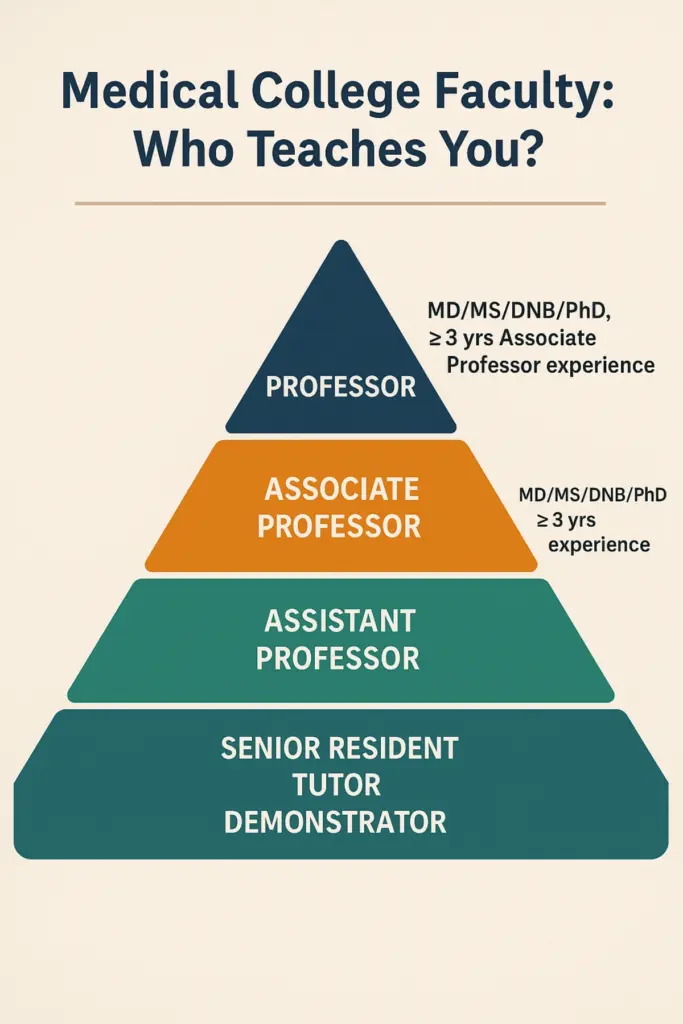NMC Medical College Faculty Rule 2025: The National Medical Commission (NMC) has released its Medical Institutions (Qualifications of Faculty) Regulations, 2025 or NMC Medical College Faculty Rule 2025, bringing in a fresh set of rules that decide who will teach the future doctors of India. If you are an MBBS aspirant, a medical student, or even a parent, this notification directly affects you, because the faculty qualifications and rules ensure the quality of your medical education.
These regulations, notified on 30th June 2025, replace the older Teachers Eligibility Qualifications in Medical Institutions Regulations, 2022, and set strict criteria for medical, dental, non-medical, and even foreign-trained faculty members.
Let’s understand what the rules mean for MBBS students in simple terms.
NMC Medical College Faculty Rule 2025
Who is “Faculty”?
In medical colleges, faculty primarily consist of Professors, Associate Professors, and Assistant Professors who hold an MBBS degree along with a higher qualification such as MD, MS, DNB, or PhD in the relevant specialty.
a) Medical Faculty
- Designations: Professors, Associate Professors, Assistant Professors.
- Qualifications: MBBS + higher degree (MD/MS/DNB/PhD in relevant specialties).
b) Non-Medical Faculty
- Eligibility: M.Sc + PhD holders.
- Applicable Subjects: Anatomy, Biochemistry, Physiology, Pharmacology, Microbiology.
c) Dental Faculty
- Eligibility: BDS + MDS specialists.
- Applicable Departments: Dentistry-related subjects.
Non-medical faculty are also permitted in subjects like Anatomy, Biochemistry, Physiology, Pharmacology, and Microbiology, provided they hold an M.Sc. along with a PhD.
For dentistry departments, BDS graduates with an MDS qualification are considered eligible as dental faculty.

Read Also: NMC Faculty Rules 2025 Aims to Expand Medical Education in India
Age Limit for Medical College Faculty
The NMC has made it clear that faculty cannot serve indefinitely. The upper age limit has been fixed at 70 years, beyond which no one can continue teaching in medical colleges.
This provision ensures opportunities for younger professionals while maintaining a dynamic teaching environment.
Rules for Administrative Positions
The regulations also define who can become a Dean, Director, Principal, or Medical Superintendent.
Eligibility for Dean/Director/Principal/Medical Superintendent
- Minimum 10 years of teaching experience.
- At least 5 years served as a Professor.
Head of Department (HOD)
Similarly, only those faculty members who possess qualifications under the NMC’s prescribed Tables A, B, C, and D, which include both broad specialties and super specialties, are eligible to become Heads of Departments (HODs).
- Only faculty with qualifications listed in Tables A, B, C, D (broad + super specialties) are eligible to head departments.
NBE Qualifications: DNB
The NMC recognises the Diplomate of National Board (DNB) as equivalent to MD/MS, but with conditions.
- DNB from 500+ bed hospitals: Treated as equivalent to MD/MS.
- DNB from <500 bed hospitals: Requires 1 additional year of senior residency for eligibility.
Senior Resident Rules
Senior residents form the backbone of medical college teaching.
According to the NMC Medical College Faculty Rule 2025, the maximum age is:
- 45 years for clinical subjects.
- 50 years for pre-clinical & para-clinical subjects.
The maximum tenure for senior residency is three years have been set as per NMC Medical College Faculty Rule 2025, and this experience will be counted as valid teaching experience for future faculty positions.
Tutors & Demonstrators
The rules also differentiate between tutors and demonstrators. Any MBBS graduate is eligible to work as a tutor.
For demonstrators, however, an M.Sc. along with a PhD in the same subject, obtained from a recognised medical institution, is required.
Foreign Medical Qualifications
Eligible if the doctor has:
- MBBS from India, and
- Postgraduate training from UK, USA, Canada, Australia, or New Zealand.
- Must also satisfy NMC’s recognition and equivalence requirements.
Read Also: NMC Allows MSc/PhD as 30% of Faculty in 5 Medical Subjects: Its Impact On Medical Education
NMC Medical College Faculty Rule 2025: Read PDF Document Here
Research Requirements for Promotions
Another important reform introduced in the NMC Medical College Faculty Rule 2025 is the emphasis on research.
Faculty promotions will now require original research publications, and only those published in indexed journals such as PubMed, Scopus, or Medline will be considered valid.
This step is expected to encourage more quality research in medical colleges and improve India’s global academic standing.
Special Rules for Dentistry and Medical Physics
In addition to general rules, special provisions have been laid down for certain departments.
For dentistry, faculty must hold an MDS degree along with adequate teaching and research experience.
For medical physics, the eligibility is restricted to those with an M.Sc. or PhD in Medical Physics, with a clear requirement of both teaching and research exposure.
The NMC Medical College Faculty Rule 2025 brings in a structured and transparent system for appointing and promoting faculty in medical colleges. By clearly defining eligibility criteria, age limits, research requirements, and administrative qualifications, the regulations aim to raise the overall quality of medical education in India.
For students, this means that those who will teach them MBBS are not only academically qualified but also experienced and research-oriented, ensuring a stronger foundation for future doctors.
NMC Medical College Faculty Rule 2025: At a Glance
| Category | Minimum Qualification | Additional Requirement |
|---|---|---|
| Medical Faculty | MBBS + MD/MS/DNB/PhD | Teaching experience & research |
| Non-Medical Faculty | M.Sc. + PhD in Anatomy, Biochemistry, Physiology, Pharmacology, Microbiology | Must be from a recognised medical institution |
| Dental Faculty | BDS + MDS | Research publications & teaching years |
| Senior Resident | MD/MS/DNB | ≤ 45 years age (50 years in pre/para-clinical) |
| Tutor | MBBS | None |
| Demonstrator | M.Sc + PhD (medical subject) | Regular course only |
Also Read: NMC Approves 123700 MBBS Seats & 808 Medical Colleges: India Beats the World in Medical Education
What This Means for MBBS Students
- Better qualified teachers: Only those with specialist degrees and research experience will teach core MBBS subjects.
- Stricter quality checks: Faculty must publish in indexed medical journals, meaning your teachers are active in research.
- Global parity: Indian medical faculty standards now align with international norms, making your degree more respected worldwide.
- No shortage compromises: During transition periods, alternate qualifications are allowed, but only with strict 3-year teaching + 2 research papers criteria.
Importance for India’s Medical Education
India has the largest number of medical colleges in the world (808 as of september 2025), but the quality of faculty has always been a concern. These new rules aim to:
- Prevent underqualified teachers from filling posts.
- Ensure consistent teaching standards across government, private, and deemed universities.
- Improve the research culture in medical education.
- Give clarity on foreign qualifications for returning doctors.
NMC Assures You!
The NMC Medical College Faculty Rule 2025 are a big step toward improving the standard of MBBS education in India. For students, this means you will be taught by highly qualified professors, researchers, and clinicians, ensuring a stronger foundation for your medical career.
So next time you sit in your MBBS lecture hall, you can be assured!
The person teaching you isn’t just a doctor, they’re a certified, experienced, and research-active expert chosen under NMC’s strict new rules.



Even MSc with Phd in subjects Medical Anatomy, Physiology, Biochemistry, Pharmacology and Microbiology are also eligible for Senior Resident post.